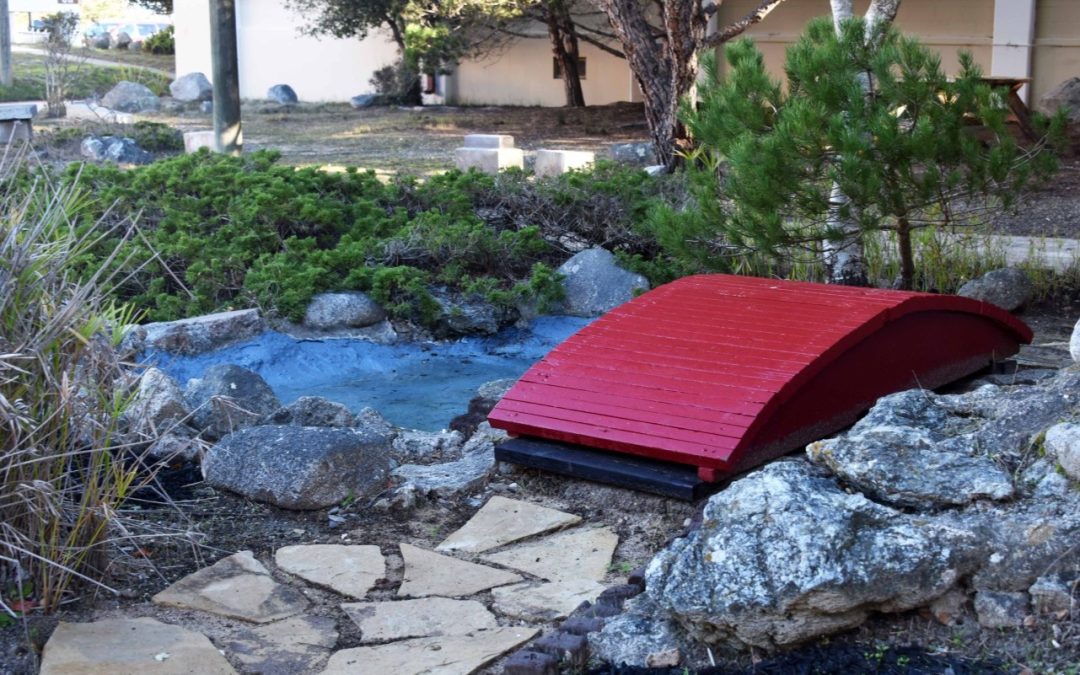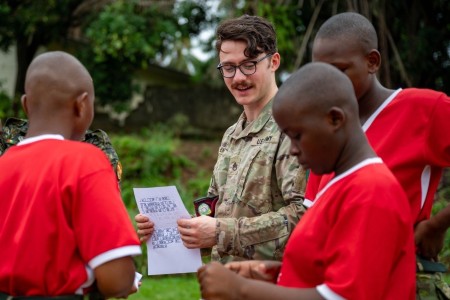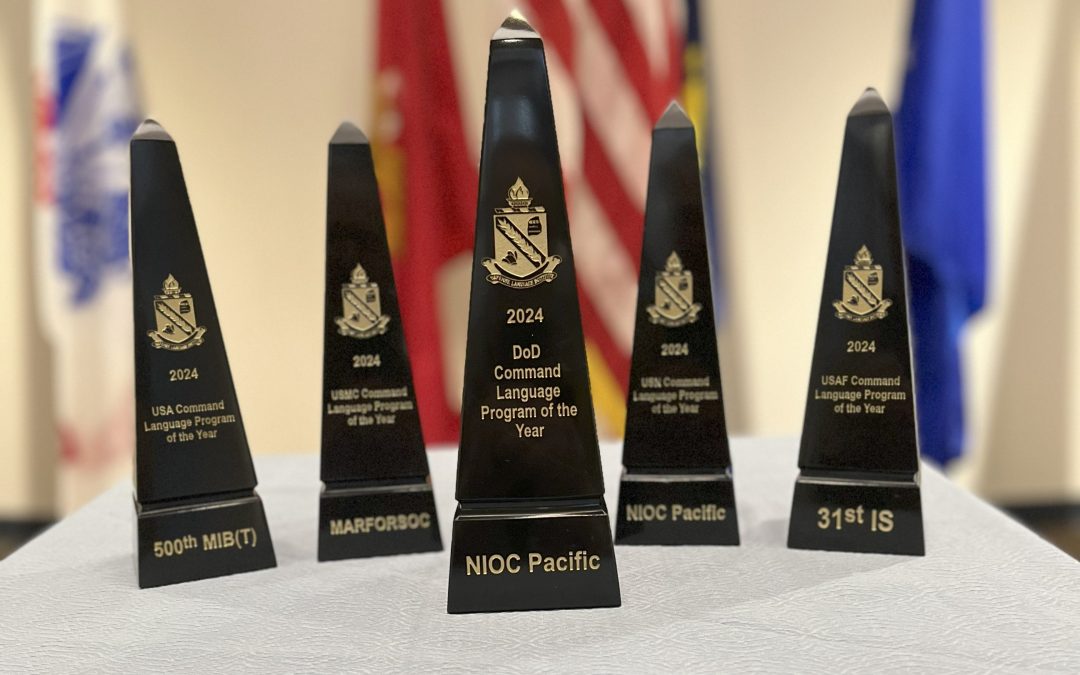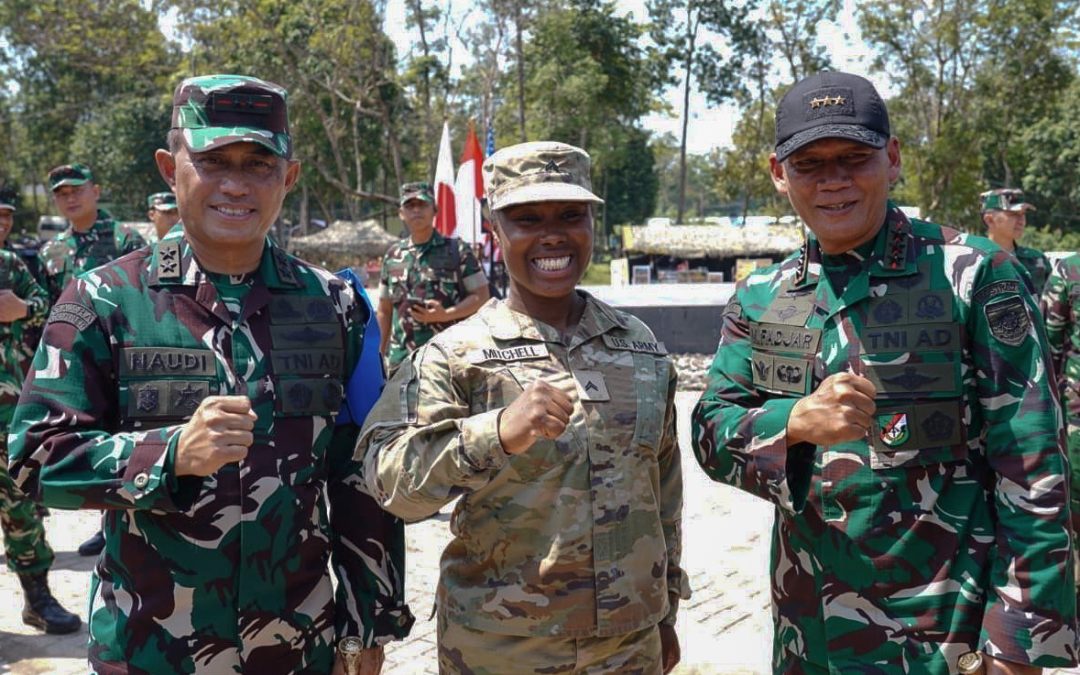By Patrick Bray
DLIFLC Public Affairs

Lt. Gen. Kevin W. Mangum, the deputy commanding general and chief of staff of the U.S. Army Training and Doctrine Command at Fort Eustis, Virginia, speaks to Defense Language Institute Foreign Language Center students outside of a dining facility at the Presidio of Monterey, California, Sept. 2. (Photo by Natela Cutter, DLIFLC Public Affairs)
MONTEREY, Calif. – The Defense Language Institute Foreign Language Center welcomed Lt. Gen. Kevin W. Mangum, the deputy commanding general and chief of staff of the U.S. Army Training and Doctrine Command at Fort Eustis, Virginia, to the Presidio of Monterey, California, Sept. 2.
“There is a lack of language proficiency in the Army. Having men and women who better understand the culture, and certainly speak the language, as we engage populations across the world is critical,” said Mangum, during his first time visit to the institute since he was appointed to his new position at TRADOC in 2014.
“Language is the driver to understanding a culture,” Mangum said, as he commended the native-speaking DLIFLC faculty who already provide a level of cultural awareness as they teach language in the classroom.
A career aviator, with overseas deployments to Korea, Honduras, the Persian Gulf, Turkey, Bosnia, Afghanistan and Iraq, Mangum recognizes the crucial role that cultural training and language familiarization play for the warfighter.

Lt. Gen. Kevin W. Mangum, the deputy commanding general and chief of staff of the U.S. Army Training and Doctrine Command at Fort Eustis, Virginia, attends an information briefing on the Defense Language Institute Foreign Language Center at the Presidio of Monterey, California, Sept. 2. (Photo by Patrick Bray, DLIFLC Public Affairs)
“With the outreach programs that DLI has, we could certainly provide better cultural awareness and some basic language skills to the operating force,” said Mangum. “We must make them more culturally aware and provide as much regional expertise as we can.”
Turning from cultural awareness to training more proficient professional linguists, Mangum spoke briefly about the value of overseas immersion training opportunities and the benefit students gain from the experience.
“It’s one thing to sit in a classroom at the Presidio of Monterey and talk about other cultures and languages, but putting it into context and perspective in the native land is priceless,” said Mangum.
DLIFLC has a robust immersion language program that sends students to more than 20 countries outside of the U.S. Returning students say that the experience improves confidence and motivation in using the language, which generally contributes to higher scores on their final language proficiency test.

Lt. Gen. Kevin W. Mangum, the deputy commanding general and chief of staff of the U.S. Army Training and Doctrine Command at Fort Eustis, Virginia, observes an Arabic language class at the Defense Language Institute Foreign Language Center, Presidio of Monterey, California, Sept. 2. (Photo by Natela Cutter, DLIFLC Public Affairs)
Recognizing that it is not possible to send every student overseas, DLIFLC has a designated Isolation Immersion facility where students spend from one to three days immersed in the language and culture, an experience that cannot be replicated in the classroom.
“I’m happy that we are doing immersions and I know there is an initiative to get more of it,” said Mangum.
Mangum’s visit to DLIFLC lasted only a day, but he was able to observe the full spectrum of training that linguists undergo. He observed language training at the institute’s Middle East School III and interacted with students studying Arabic. He then visited the Directorate of Continuing Education to observe further education of linguists after completing the basic program. Later in the day, Mangum spoke to Command Language Program Managers who are responsible for ensuring that units in the field continue to provide language sustainment opportunities for professional linguists.

Lt. Gen. Kevin W. Mangum, the deputy commanding general and chief of staff of the U.S. Army Training and Doctrine Command at Fort Eustis, Virginia, speaks at the Command Language Program Managers conference at the Defense Language Institute Foreign Language Center, Presidio of Monterey, California, Sept. 2. (Photo by Patrick Bray, DLIFLC Public Affairs)
“It all starts here. DLIFLC plays a great role for the entire joint force in what it provides,” said Mangum. “Obviously this is where we grow our linguists in their language proficiency and then send them out to the rest of the big-wide world. The language experts, the linguists that are trained here, certainly make a difference when they hit the ground in their units.”
“This is a world-class language institute… and a national treasure. It was a pleasure to see it and learn more about it,” said Mangum.
DLIFLC is regarded as one of the finest schools for foreign language instruction in the world. The Institute provides resident instruction in 23 languages to approximately 3,500 military service members, five days a week, seven hours per day, with two to three hours of homework each night. Generally, students spend between 26 and 64 weeks at the Presidio, depending on the difficulty of the language.




